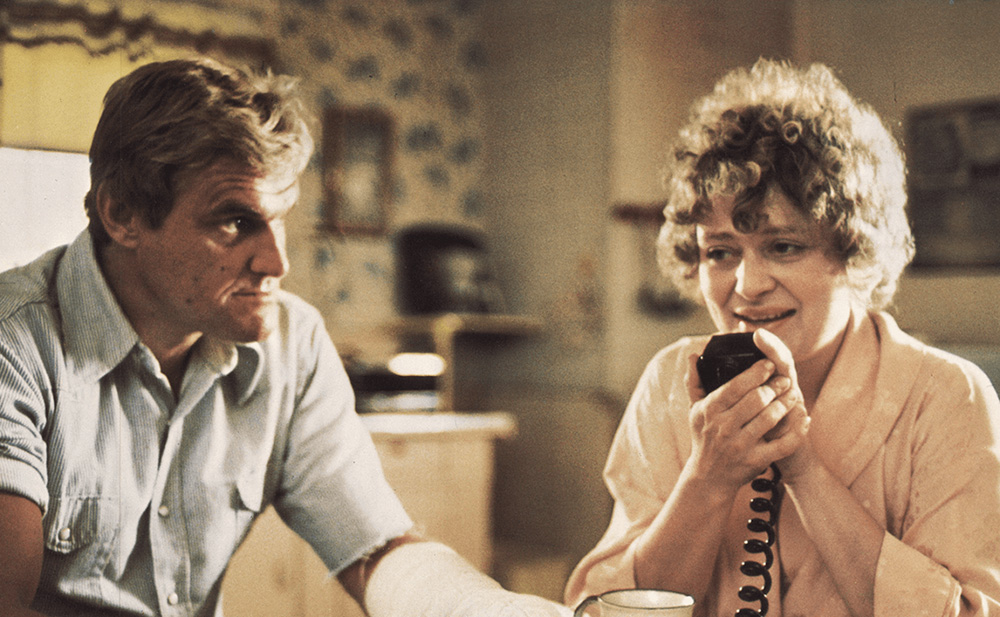By the mid-70s, the Federal Communications Commission had begun enforcing 18 U.S.C. 1464, a broadcast code that banned utterances deemed obscene, indecent, and profane. The ubiquity of mass communications beget national anxieties over the potential for on-air blasphemy, from curse words to antiwar sentiments. The necessity of its control was bound to discourse on responsibility and goodness that called upon the government to step in as a stern guardian. But matters were more amorphous, too––questions about what virtues were in play when one speaks to another underscored public debate. In one particular case, the Supreme Court took the “average” person’s sense of what was right to be indicative of regulatory character, ruling that “community standards” should be applied when judging the social value of speech.
Jonathan Demme’s Citizens Band (1977)—at once a portrait of the flyover West and of a small town connected through citizens band radio communications—examines the community of Union, Nebraska. The cast of Union includes a phony priest on Channel 7, a Nazi on Channel 4, a radio-sex channel breaker, and an emergency “Union Jack” responder on Channel 9—all broadcasting their fervent declarations. In the film, the responder is Blayne “Spider” Lovejoy (Paul Le Mat), a forlorn but quixotic young man, who embarks on a crusade to “clean up the channel” and impose some standards upon the rambling transmissions cluttering the town. Declaring improper use, profanity, idle chitchat, deception, and unlicensed operation unacceptable per FCC guidelines––a Haysian Formula for radio––he chides fellow citizens and cuts antenna cables; his actions are vitalized by an anthemic score. Spider’s high-stakes campaign is endearingly self-serious, as the characters’ ignorance of national citizenry is one of charming small-town scope; they blow off taxes and grumble at the four-dollar CB license fee in place by 1975. Union is a rogue little community, averse to imposition, yet faithful to the rights they share. The priest, stubbornly refusing Spider’s demands to stop interrupting channels, asks, “Do you believe in G-O-D? Well, maybe I don’t believe in F-C-C.” A nostalgic idealism makes Spider a youthful folk hero for the radio age, as Union’s middle-aged residents loitering at the local diner brush off the impossibility of moral rehabilitation on a national scale: “What do you expect, Spider, with 20 million units out there?”
But his mission is local, even as the country goes mobile. Films like Breaker, Breaker and Smokey and the Bandit were also released in 1977, and they foreground the eclecticism and drama of reliance upon citizens band radio. But Citizens Band takes place squarely in Union, not on cross-country truckers’ routes. Here, radio is constitutive of a certain kind of small-town public that’s cast into flux by too many voices jamming the broadcast. A microcosmic portrait of the tensions between individual freedoms and pseudo-Christian moral politics, the film shows some of Spider’s supporters: a mother whose adolescent son jams transmissions with proclamations that he’s the “hottest stud in town” and a veterans organization who bestows Spider a medal for his bravery and courage as the emergency operator, declaring, “We hope it will be a model for all our citizens.”
Spider is the ad hoc government of a town otherwise scarce in authority, a town in which radio is more symbolic than law. Familiar desires—home ownership, children, care—beset the town’s residents, who quietly admit they’ve “been going through some heavy things.” Radio is an alienating medium only to the extent that its citizenry is already plagued by their strained and affectionate attempts to know one another. Union has the reticent father and the son stuck caring for him, the lover hurt by suspicions that his girlfriend is cheating on him, and the two wives unknowingly married to the same man. (Harold, the film’s unethical polygamist, declares that “basically, I think we’ve got a communications problem”). Their desire for free speech manifests itself in their fuss about regulations, but their loneliness is hardly derived from media frenzy. Wistful and tender, Citizens Band is certainly not excavated of interpersonal dramas; its most sincere moments emerge when no radio is on in the background, when plainspoken conversations about dashed hopes and bittersweet futures cut through the noise. And when “Papa Thermodyne” is lost, the town turns into a neighborly search-and-rescue, calling out with their voices for “Floyd” through the creeks: “If you can hear us, give us a sign.”
Citizens band radio is a short-distance and wireless technology that was particularly popular among ‘70s truckers as they drove across the United States. But Union is far from the United States—it takes days to get spare car parts from Lincoln—and citizens band radio steps in to provide an experience of the out there, of anonymity and dislocation, to the citizens of Union who are just fine, albeit disaffected, staying where they are. As the Channel 7 priest officiates, over CB, the wedding of Spider and Electra—all of whom are in separate vehicles—telephone lines expand across the highway background. They are immobile, stark, and vast, spreading far past Union. This final image, and the film itself, are a perhaps unknowing ode to a bespoke and soon-bygone era of a town’s intimate and hermetic communications. In 1983, individual licensing for citizens band radio came to an end.
Citizens Band screens tonight, September 14, at the Museum of Modern Art as part of the series “Paramount in the 1970s.”



